De Oostenrijkse dichter en schrijver, musicus en cabaretier Martin Auer werd geboren op 14 januari 1951 in Wenen. Zie ook alle tags voor Martin Auer op dit blog.
Uit: Und jetzt?
“Ich bin die Johanna!”
Der Mann in dem verdreckten Zimmer reisst die Augen auf. Es kann sein, dass ein oder zwei Erbsen aus seinem offenen Mund auf den Teller zurückfallen. Der Löffel in seiner Hand bleibt über dem Teller hängen wie ein verlorenes Raumschiff über einem toten Planeten.
Fassungslos starrt er das Mädchen an, das in der Tür steht, die Arme hängen lässt und anscheinend nicht mehr zu sagen hat, als sie schon gesagt hat. Jetzt ist er dran, soviel ist ihm klar. Aber was sagt man zu einer Tochter, die man vor Jahren – waren es sechs? Sieben? Acht? – verlassen hat, besser aufgehoben bei der tüchtigen Mutter als beim verwahrlosten Vater, und die jetzt vor einem steht, blass und mager, Augenbrauen, Nasenflügel und Lippen von Ringen durchstochen, und einen mit den dick schwarz eingerandeten Augen ansieht wie ein kriegsgefangener Offizier, der fest entschlossen ist, nicht mehr von sich preiszugeben als Name und Dienstgrad?
Der Augenblick gerinnt zu Minuten. Als wären sie beide eingefroren in diesen Augenblick, ohne jemals wieder daraus auftauchen zu können. Ihr argwöhnischer Blick prallt auf seine graue Haut, seine Bartstoppeln, die Tränensäcke, das schüttere zerraufte Haar, den verblödeten Blick. Sein Hemd ist fleckig, die Hand, die den Löffel in Schwebe hält, zittert. Auf dem Tisch, an dem er seine Erbsen isst, stapeln sich alte Zeitungen und leere Konservendosen, eine zerrissene Socke krönt das Arrangement.
Der verwahrloste Alte versucht zu schnallen, was gespielt wird, aber der Blick seiner Tochter verrät ihm nichts. Diese Augen sind ein einziger Vorbehalt, enthalten sich jeden Urteils und geben nichts preis. Vorläufig steht sie hier in der Tür, und über ihren nächsten Schritt wird sie entscheiden, wenn es soweit ist. Jetzt ist erst einmal er am Zug, und das ist es, was ihn so verwirrt.
Schließlich findet er den Ausweg. Er lässt die Hand mit dem Löffel sinken, ergreift stattdessen das Glas, das neben dem Teller steht, hebt es hoch und sagt: “Prost!”
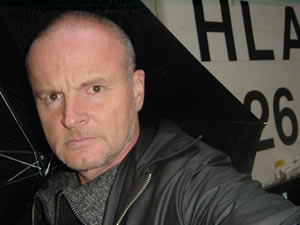
Martin Auer (Wenen, 14 januari 1951)
De Amerikaanse schrijver John Dos Passos werd geboren op 14 januari 1896 in Chicago. Zie ook alle tags voor John Dos Passos op dit blog.
Uit: 1919 (U.S.A.)
“T.R. drove like a fiend in a buckboard over the muddy roads through the driving rain from Mt. Mercy in the Adirondacks to catch the train to Buffalo where McKinley was dying,
As President
he moved Sagamore Hill, the healthy, happy normal American home, to the White House, took foreign diplomats and fat armyofficers out walking in Rock Creek Park where he led them a terrible dance through brambles, hopping across the creek on cobblestones, wading the fords, scrambling up the shady banks.,
and shook the Big Stick at malefactors of great wealth.
Things were bully.
He engineered the Panama revolution under the shadow of which took place the famous hocuspocus of juggling the old and new canal companies by which forty million dollars vanished into the pockets of the international bankers,
but Old Glory floated over the Canal Zone.
and the canal was cut through.
He busted a few trusts,
had Booker Washington to lunch at the White House,
and urged the conservation of wild life.
He got the Nobel Peace Prize for patching up the Peace of Portsmouth that ended the Russo-Japanese War,
and sent the Atlantic Fleet around the world for everybody to see that
America was a firstclass power. He left the presidency to Taft after his second term leaving to that elephantine lawyer the congenial task of pouring judicial oil on the hurt feeling of the moneymasters.”
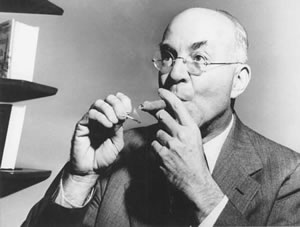
John Dos Passos (14 januari 1896 – 28 september 1970)
De Joods-Amerikaanse schrijfster, dichteres en feministe en Tillie Lerner Olsen werd geboren in Omaha (Nebraska) op 14 januari 1912. Zie ook alle tags voor Tillie Olsen op dit blog.
Uit: Tell Me a Riddle
“For forty-seven years they had been married. How deep back the stubborn, gnarled roots of the quarrel reached, no one could say — but only now, when tending to the needs of others no longer shackled them together, the roots swelled up visible, split the earth between them, and the tearing shook even to the children, long since grown.
Why now, why now? wailed Hannah.
As if when we grew up weren’t enough, said Paul.
Poor Ma. Poor Dad. It hurts so for both of them, said Vivi. They never had very much; at least in old age they should be happy.
Knock their heads together, insisted Sammy; tell ‘em: you’re too old for this kind of thing; no reason not to get along now.
Lennie wrote to Clara: They’ve lived over so much together; what could possibly tear them apart?
Something tangible enough.
Arthritic hands, and such work as he got, occasional. Poverty all his life, and there was little breath left for running. He could not, could not turn away from this desire: to have the troubling of responsibility, the fretting with money, over and done with; to be free, to be carefree where success was not measured by accumulation, and there was use for the vitality still in him. There was a way. They could sell the house, and with the money join his lodge’s Haven, cooperative for the aged. Happy communal life, and was he not already an official; had he not helped organize it, raise funds, served as a trustee?”
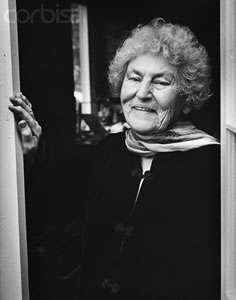
Tillie Olsen (14 januari 1912 – 1 januari 2007)
De Poolse schrijver Marek Hlasko werd geboren op 14 januari 1934 in Warschau. Zie ook alle tags voor Marek Hlasko op dit blog.
Uit: The Beautiful Twenty-Year-Olds
“I write about people I have known and loved. … It is for those people that I would like to write why I do not live in Warsaw. I would like to write it because I owe a lot to those people, I have not stopped loving them and cannot forget them. … I have told myself: Poland is not Putrament or Kruczkowski [the latter summed up Hłasko at the 12th plenum of the Central Committee in October 1958 in the following way: “As we can see, comrades, the road from a first step into the clouds … to the last step into the bog of imperialist intelligence is not long”], and all the others. Poland is all those people who read me and believed in me. … I knew of course that nobody believed in my working for anti-Polish intelligence, but should there be one reader who believed that, this book has been written for him.“
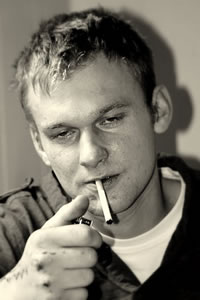
Marek Hlasko (14 januari 1934 – 14 juni 1969)
De Duitse dichter en schrijver Rudolf Hagelstange werd geboren op 14 januari 1912 in Nordhausen. Zie ook alle tags voor Rudolf Hagelstange op dit blog.
Wir nennen es Winter
Wir nennen es Winter. Und meinen damit:
Atemholen des Lebens, und über Verwesung
kühles Leinen des Schnees. Ostwind ums Haus
Scheite im Ofen, im Kreis einer Lampe
Nüsse und Wein. Die Mette, den Christbaum.
Freude, aufs Eis geschrieben, Spuren im Schnee.
Und immer der Wechsel vom Kalten ins Warme.
Später die Feste mit Masken und tanzenden Paaren.
Föhn in den Adern. Und Krokus in schneenassen
Fäusten des jungen Frühlings.
Sommerliches Gebet
Lass das Korn am Halm sich häufen
und die Frucht im Feld!
Lass das Heu der Wiesen reifen,
Herr der Welt!
Nimm das Vieh auf deinen Weiden
unter deine Hut
und die Hirten, die da leiden
in der Mittagsglut.
Lass die Winde leiser wehen
vor der Sonne Bild!
Lass den Regen niedergehen,
der die Brunnen füllt!
Führe uns auf jeder Straße
– Wiesenland und Stein – !
Aber lass nach deinem Maße
uns zum Heil es sein!
Ohne dessen Plan vom Dache
nicht ein Sperling fällt,
schütze uns vor Ungemache,
Herr der Welt!
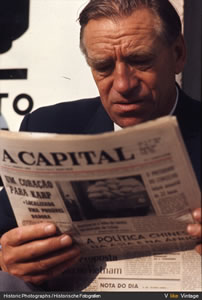
Rudolf Hagelstange (14 januari 1912 – 5 augustus 1984)
